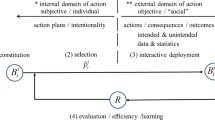Abstract
This paper proposes a dynamic game-theoretic statement of the resource allocation problem in an organizational system. The application of evolutionary modeling algorithms for solving such problems is considered. Some illustrative examples are given.
Similar content being viewed by others
References
Beliavsky, G.I., Lila, V.B., and Puchkov, E.V., The Algorithm and Software Implementation of Hybrid Learning for Artificial Neural Networks, Progr. Produkty Sist., 2012, no. 4, pp. 96–101.
Beliavsky, G.I., Danilova, N.V., and Ougolnitsky G.A., Evolutionary Modeling in the Problems of Sustainable Management of Active Systems, Mat. Teor. Igr Prilozh., 2016, vol. 8, no. 4, pp. 14–29.
Germeier, Yu.B. and Vatel’, I. A., Games with a Hierarchical Vector of Interests, Izv. Akad. Nauk SSSR, Tekh. Kibern., 1974, no. 3, pp. 54–69.
Gladkov, L.A., Kureichik, V.V., and Kureichik, V.M., Geneticheskie algoritmy (Genetic Algorithms), Moscow: Fizmatlit, 2006.
Gorbaneva, O.I., Game-Theoretic Resource Allocation Models in Hierarchical Quality Control Systems for River Water, Mat. Teor. Igr Prilozh., 2010, vol. 2, no. 1, pp. 27–46.
Gorbaneva, O.I. and Ougolnitsky, G.A., Static Models of Coordination of Social and Private Interests in Resource Allocation, Autom. Remote Control, 2018, vol. 79, no. 7, pp. 1319–1341.
Emel’yanov, V.V., Kureichik, V.V., and Kureichik, V.M., Teoriya i praktika evolyutsionnogo modeliro-vaniya (Theory and Practice of Evolutionary Modeling), Moscow: Fizmatlit, 2003.
Kukushkin, N.S., On the Existence of Stable Outcomes in a Game-Theoretic Model of an Economy with Public Goods, Dokl. Akad. Nauk SSSR, 1991, vol. 320, no. 1, pp. 25–28.
Novikov, D., Theory of Control in Organizations, New York: Nova Science, 2013.
Pecherskii, S.L. and Yanovskaya, E.E., Kooperativnye igry: resheniya i aksiomy (Cooperative Games: Solutions and Axioms), St. Petersburg: Evrop. Univ., 2004.
Ugol’nitskii, G.A. and Usov, A.B, A Study ol Differential Models for Hierarchical Control Systems via Their Discretization, Autom. Remote Control, 2013, vol. 74, no. 2, pp. 252–263.
Bergstrom, T., Blume, O, and Varian, H., On the Private Provision ol Public Goods, J. Public Econom., 1986, no. 29, pp. 25–49.
Boadway, R., Pestiau, P., and Wildasin, D., Non-cooperative Behavior and Efficient Provision ol Public Goods, Public Finance, 1989, no. 44, pp. 1–7.
Boadway, R., Pestiau, P., and Wildasin, D., Tax-Transfer Policies and the Voluntary Provision ol Public Goods, J. Public Econom., 1989, no. 39, pp. 157–176.
Christodoulou, G., Sgouritza, A., and Tang, B., On the Efficiency olthe Proportional Allocation Mechanism for Divisible Resources, in Proc. 8th Int. Symp. on Algorithmic Game Theory (SAGT dy2015), Hoefer, M., Ed., New York: Springer, 2015, pp. 165–177.
Cornes, R. and Hartley, R., Asymmetric Contests with General Technologies, Econom. Theory, 2005, vol. 26, no. 4, pp. 923–946.
Cornes, R. and Sato, T., Existence and Uniqueness ol Nash Equilibrium in Aggregative Games: An Expository Treatment, in Equilibrium Theory for Cournot Oligopolies and Related Games, von Mouche, P. and Quartieri, F., Eds., New York: Springer, 2016, pp. 47–61.
Kahana, N. and Klunover, D., Private Provision ol a Public Good with a Time-Allocation Choice, Social Choice Welfare, 2016, no. 7, pp. 379–386.
Kukushkin, N.S., A Condition for Existence ol Nash Equilibrium in Games with Public and Private Objectives, Games Econom. Behav., 1994, no. 7, pp. 177–192.
van Long, N., A Survey of Dynamic Games in Economics, Singapore: World Scientific, 2010.
Petrosyan, L.A. and Zenkevich, N.A., Game Theory, Singapore: World Scientific, 2016.
Acknowledgments
This work was supported by the Russian Science Foundation, project no. 17-19-01038.
Author information
Authors and Affiliations
Corresponding authors
Rights and permissions
About this article
Cite this article
Beliavsky, G.I., Danilova, N.V. & Ougolnitsky, G.A. Evolutionary Methods for Solving Dynamic Resource Allocation Problems. Autom Remote Control 80, 1335–1346 (2019). https://doi.org/10.1134/S0005117919070105
Received:
Revised:
Accepted:
Published:
Issue Date:
DOI: https://doi.org/10.1134/S0005117919070105



